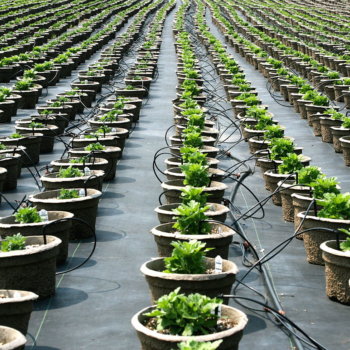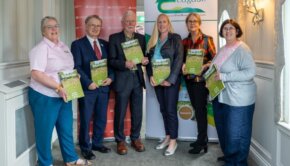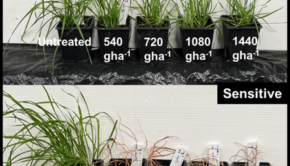‘2018 has been challenging for growers’ – Teagasc’s Dr John Spink

Teagasc's Dr John Spink discusses Teagasc's Nursery Stock Seminar, which was held on October 24, and the challenges facing the Irish Nursery Stock Sector in 2018.
25 October 2018
On Wednesday, October 24, Teagasc held their Nursery Stock Seminar at their Food Research Centre in Ashtown. We spoke with Dr John Spink, head of the Crops Environment and Land Use Programme in Teagasc, who opened the seminar, to discuss the pressing issues facing the nursery stock sector in 2018.
The Seminar
“The aim of the Teagasc Nursery Stock Seminar is to provide technical insights to growers in some key areas. 2018 has been challenging for growers, many will be thinking of how to get the best out of their employees, marketing, irrigation etc. There will be action points shared that growers can take away for immediate use as well as for some long term strategic planning. It’s a good chance to get growers to reflect on the season just past and see what others in the sector are doing to stay ahead.
“Traditionally there has been an autumn seminar held as this has been a slightly quieter time of the year for some. In addition, Dónall Flanagan the Teagasc Nursery Stock advisor, organises events throughout the year including nursery visits, seminars and study tours; however, these larger annual events are important because of the networking opportunities they provide for the sector.”
Key Challenges
“2018 is almost over and there were many weather challenges; a long wet winter and spring, storm Emma in March causing much damage, and then drought. All of these things hit customer demand and limited planting opportunities for landscapers.
“Thankfully the autumn weather has been good and many growers have been busy. The supply of young plants from the continent has been hit by the long hot summer and growers will see shortages in some lines together with price increases.
“The other key issue facing growers is labour, both skilled and unskilled. Teagasc conducted a labour survey and found there are shortages across sectors. While growers have been adopting automation for many years other strategies will need to be developed efficiencies as business grow.
“Foreign Exchange hasn’t been such as much of an issue for exporters as other sectors as many growers are invoicing in euros, Ireland’s plant health status is a real and practical benefit when it comes to exporting to the UK as we have very similar protected zone status. Xylella has been detected on one nursery in Belgium recently, this remains a worry for the sector at large.”
Storm Ophelia
“There was devastation caused by the storm and the full cost wont be clear until the end of this year’s harvest as some trees couldn’t be lifted last year. However, there have been a number of weather shocks to the industry since Ophelia, including the late snow which caused damage to structures and the summer drought and hosepipe ban which reduced demand for nursery stock.
“There has been a lot learned in the recent years, but storms and snow are a worry when they happen. Some growers have invested in stronger tunnels and snow bars but thanks to good advanced weather forecast growers can prepare reasonably well.
“Growers are optimistic by their nature, but fortune favours the prepared and growers make good use of the NDP grant scheme to improve infrastructure which limit their exposure such as the establishment of wind breaks.
“Teagasc publications and efforts by the Health and Safety Authority (HSA) have encouraged farm and nursery owners to act to protect their own safety and that of their employees during serious weather events. A survey at today’s seminar showed that the growers in the audience were overwhelmingly optimistic about the future of the sector.”
Government Schemes
“The Department of Agriculture, Fisheries, and the Marine’s grant in aid scheme (mentioned above) support the horticulture sector with capital investments. It’s in the growers interest to have adequate insurance in place to protect their infrastructure and stock.
“The government’s low cost loans scheme is a welcome initiative and we hope to see growers make use of it in 2019. This year the Department of Business, Enterprise and Innovation (DBEI) launched a pilot work permit scheme for 500 non-European Economic Area (EEA) residents to work in the horticultural sector, this is greatly welcomed and should see wider apportion in 2019.”
Brexit
“Bord Bia are working closely with the sector to identify new opportunities for exports. They have some key initiatives that growers can use for self assessments.
“Today’s seminar included a very good presentation from Barry Delaney, head of Plant Health in DAFM on changes in regulation which are due next year for the import and export of plants and what the implications of Brexit may be. There was also a though provoking talk From Neville Stein on the need for growers to innovate in time of change.”
Final Comments
“During the public service recruitment embargo there was no nursery stock adviser in Teagasc, it was very encouraging to see today the impact that Dónall has had and the positive response of the sector. The prospect of a apprenticeship programme for horticulture as presented today by Dr Paul Fitters from the Botanic gardens also give hope for a bright future for the sector.”



 Print
Print






Fans 0
Followers